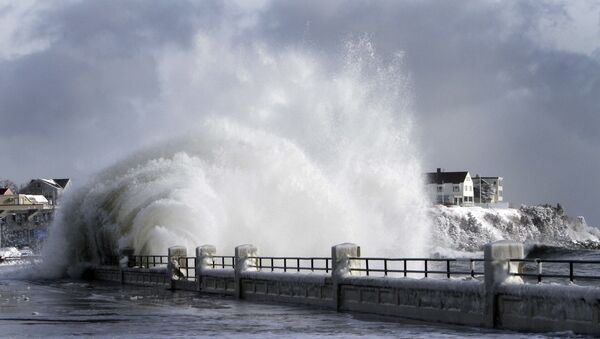The study documenting the sharp global sea level rise is based on 25 years of satellite research data using a space network of four orbital Earth-observation platforms.
Titled: ‘Climate-Change-Driven Accelerated Sea-Level Rise Detected in the Altimeter Era,' the new paper has revealed that global sea levels have risen by an average of 3 millimeters annually, adding that this rate is accelerating by 0.084 ± 0.025 mm/y2 over the past 25 years, according to Wunderground chief meteorologist Dr. Jeff Masters.
If the current rate of acceleration continues to 2100 according to the study, global sea levels are estimated to rise by some 26 inches, more than double the 11-inch rise if sea levels simply continue at their current constant surging of about 3 mm/yr.
Study authors note several data points that could shift the current findings, including sea-going instrument drift and changes in how much water is stored on land as a result of the natural El Niño and La Niña cycles.
Varying ice sheet melts could also give the impression of a long-term acceleration over the 25-year data record, as well as the sporadic eruptions of large volcanoes.
But, significantly, even while correcting for these variables, the study authors concluded that the probability that there is no acceleration in the rise of sea levels is less than 1 percent, indicating that the interpretation of the data is accurate and that coastal communities need to start making some long-range plans if they wish to stay reasonably dry.
The scientists responsible for assembling and collating the data that documents these alarming conclusions have, notably, doubled-down on their statements, observing that their estimates may well be conservative, primarily as rapid melting of Greenland and Antarctic ice sheets could easily cause a higher acceleration of sea level rise.
As if those assertions were not enough to have seaside neighborhoods packing their bags, study authors add that "few potential processes exist to suggest that this estimate is too high," cited by Wunderground.
These dire-seeming predictions by climatologists that global sea levels will rise by 26 inches between now and 2100 is supported by evidence presented by a 2013 Intergovernmental Panel on Climate Change report, as well as a 2017 Climate Science Special Report from the US Fourth National Climate Assessment, cited by Masters.
An acceleration in the rise of sea levels around the globe has long been predicted in climate modeling, according to Wunderground, but to see the evidence presented so clearly is a wake-up call for policy-makers and regular folks alike.
Rising sea levels will result in civilization-level upheaval in coming years, as hundreds of millions of coastal residents around the globe abandon homes while flooding tidal waters drown urban areas and destroy crucial infrastructure, including transportation systems, sewage treatment plants and the power grid.
The destruction is happening now, say climatologists, pointing to the 2012 Hurricane Sandy storm surge in New York City which caused some $2 billion in damages.
In the words of Duke University sea-level-rise expert Dr. Orrin Pilkey in the 2016 book ‘Retreat From a Rising Sea; Hard Choices in an Age of Climate Change,' "Like it or not, we will retreat from most of the world's non-urban shorelines in the not very distant future."
"Our retreat options can be characterized as either difficult or catastrophic," writes Pilkey, adding, "we can plan now and retreat in a strategic and calculated fashion, or we can worry about it later and retreat in tactical disarray in response to devastating storms."
"In other words," he remarks, "we can walk away methodically, or we can flee in panic."






